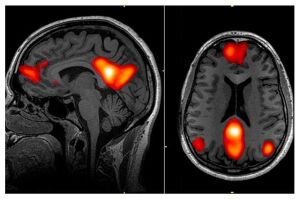by
Lauren Dubinsky, Senior Reporter | February 21, 2018

UCLA researchers used MR to examine
activity in the default mode network,
which is centered in the brain regions
highlighted in red.
UCLA researchers developed a new technique that combines fMR brain imaging and machine learning to predict whether patients with OCD will benefit from cognitive behavioral therapy (CBT).
“We would not have been able to look at the regions we looked at and provide the functional connectivity metrics we were interested in without fMRI,” Nicco Reggente, a UCLA doctoral student and the study’s first author, told HCB News.
He added that since OCD has been associated with aberrant connectivity across cortical networks, the use of fMR was crucial to investigate these regions.



Ad Statistics
Times Displayed: 173019
Times Visited: 3144 For those who need to move fast and expand clinical capabilities -- and would love new equipment -- the uCT 550 Advance offers a new fully configured 80-slice CT in up to 2 weeks with routine maintenance and parts and Software Upgrades for Life™ included.
This technique has the potential to improve the success rate of CBT and enable clinicians to personalize treatment for each patient. If it predicts that a patient will be a non-responder to CBT, different treatment options could be explored.
Reggente and his team performed fMR exams on 42 patients with OCD between the ages of 18 and 60, before and after four weeks of daily, intensive CBT. They examined how different parts of the brain activate in sync with each other when the patient is resting.
The team also evaluated the severity of each patient's symptoms before and after treatment. They then plugged the fMR and symptoms data into a computer and leveraged machine learning to predict which patients would respond.
The machine learning algorithm predicted which patients would not respond to CBT with 70 percent accuracy. It also accurately predicted the patients’ final scores on the symptoms assessment with a small margin of error.
“We want to get to 100 percent [accuracy],” said Reggente. “The paths towards doing that would be first adding more patients so that the model has a better estimate of the variance. Secondly, we could insert additional feature sets into the model.”
For example, instead of just assessing functional connectivity, they could also look at structural connectivity. That would provide information on how well wired up the neurons across regions are.
It does cost several hundred dollars to perform and interpret a brief MR exam, but the cost of CBT ranges from $2,500 to $5,000 per week and usually spans four to eight weeks. UCLA’s fMR/machine learning technique could help patients who are unlikely to respond to CBT avoid those treatment costs.

